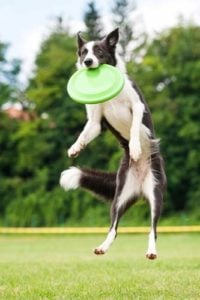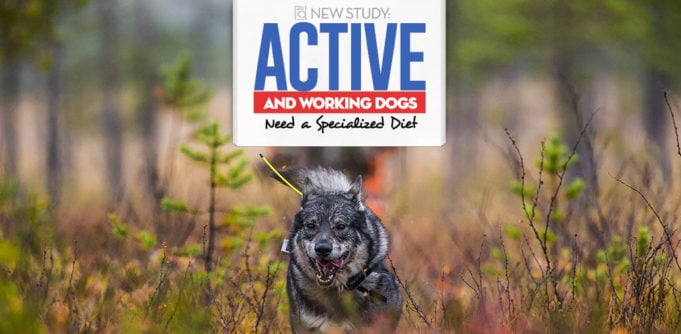Owners of very active, working dogs need a special diet for their pet to support the body during exercise. Scientists found that many working breeds are not receiving a sufficient amount of nutrition from “regular” pet food recipes.
Gym rats and bodybuilders all have special meals planned out for their regular workout sessions. Eating right supports your body and gives you the ability to exercise safely and continue to build muscle. So why shouldn’t dogs have a similar meal plan before vigorous exercise, job or training routine?
During exercise, bodies produce “free radicals,” which cause damage on a cellular level. Researchers at the University of Illinois found that dogs produce these free radicals during exercise the same way humans do, and in their new 2018 study they observed how different types of working dogs, especially hunting canines, may be in danger of damage if not fed the proper diet that contains certain antioxidants, particularly taurine and vitamin E.
The research was mainly focused on gun dogs, but all exceptionally active dogs should be eating a supportive diet to feed their needs. Whether they hunt, herd, compete, or just run trails with their owners every day, active dogs should have plenty of antioxidants and sufficient amount of protein and fats in their diet, scientists now claim.
READ THIS: The Science-based Guide for Feeding Athletic Dogs
The Dangers Of Free Radicals
“We can conclude that athletic dogs may benefit from supplementation of vitamin E and taurine to minimize oxidation and maintain taurine status.”
Free radicals oxidize cells, a process that’s similar to how rust forms on metal. Antioxidants are chemicals that slow or stop the process of oxidation in the body. Vitamins and minerals like zinc, taurine, lutein, and vitamins C and E are all antioxidants that are found in smaller amounts in regular dog food, but research suggests that the concentration may not be high enough for active dogs.
As dogs exercise in excess, more and more free radicals build up in their body, and without the proper amount of antioxidants, the free radicals will cause cellular damage. The amount of exercise and the number of antioxidants in a dog’s diet should be an equal ratio. If not, these free radicals can start to build up and could eventually even cause cancer.
Research On Hunting Dogs
Over the course of one hunting season, researchers began testing on a group of foxhounds who went hunting with handlers. The hounds went on hunting expeditions from two to five hours. The researchers considered it “unstructured endurance exercise” because the dogs aren’t running the whole time.
They fed half of the group a regular diet, and the other half received food with extra antioxidants. By comparing blood tests from before the start of the study and throughout the study, the scientists found that the dogs on the high-antioxidant diet had less oxidation after exercising. They also discovered that the most important supplements for active dogs are vitamin E and taurine.
What Can You Feed Your Active Dog?
 Many dog-safe human foods are rich in antioxidants and your dog will love the extra treat in his food. Beans like pinto and kidney beans are high in folate; berries like raspberries and strawberries have various antioxidants, with blueberries being one of the ultimate treats for dogs; organ meats are extremely rich in nutrition, and muscle meats like dark chicken meat are high in taurine, which also boosts dogs’ heart-health and muscle growth.
Many dog-safe human foods are rich in antioxidants and your dog will love the extra treat in his food. Beans like pinto and kidney beans are high in folate; berries like raspberries and strawberries have various antioxidants, with blueberries being one of the ultimate treats for dogs; organ meats are extremely rich in nutrition, and muscle meats like dark chicken meat are high in taurine, which also boosts dogs’ heart-health and muscle growth.
However, be sure to talk to your vet before adding anything new to your pup’s food. Not only could adding a bunch of new foods give your dog an upset stomach, but too many antioxidants in human diets have been found to cause harm and potentially even increase cancer cell growth. It’s hard to say how an overload of antioxidants may affect dogs, as there is minimal research surrounding it, but it’s better to be safe than sorry.
If your dog’s exercise level is above average and you think he might benefit from more antioxidants, talk to your vet about what you can safely add to his diet. It may seem like an unnecessary change, but you could end up increasing the quality and quantity of your dog’s life. There’s no harm in trying to keep your best furry friend healthy.
READ NEXT: Top 10 Best Performance Dog Foods for Working and Athletic Dogs













